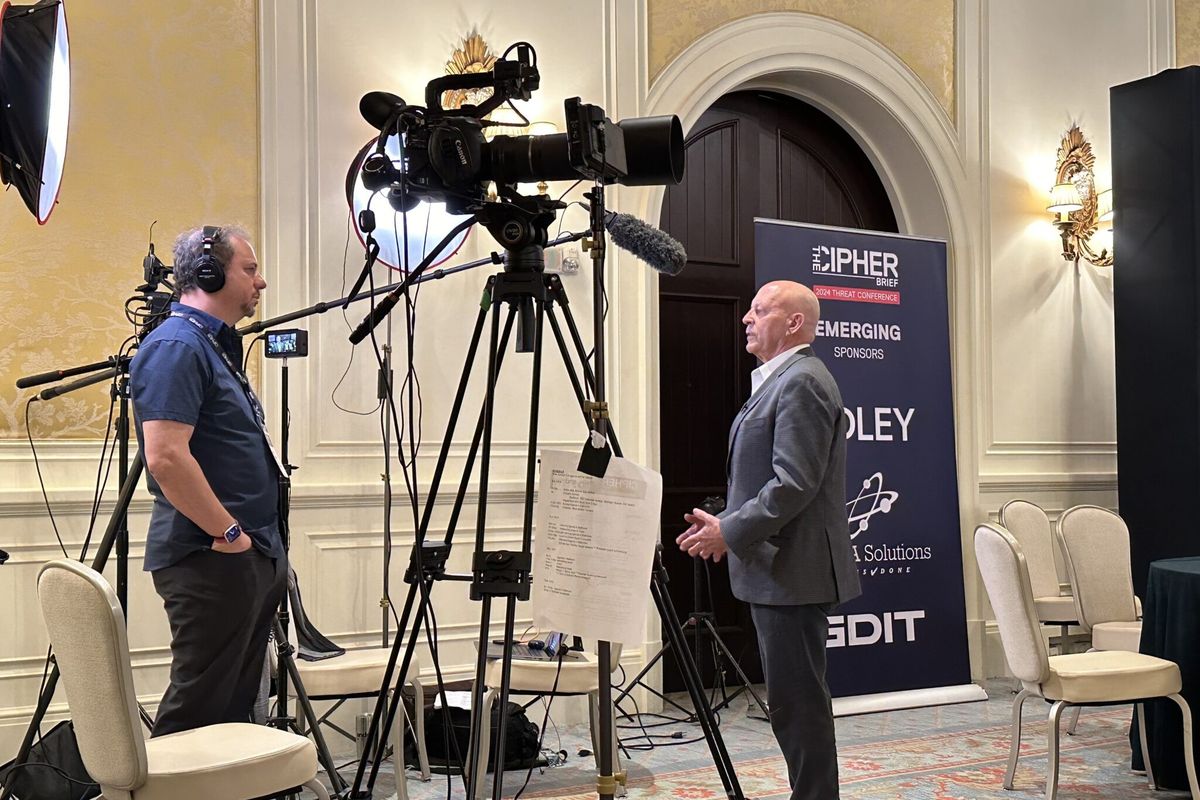Bill Harlow knows how to use a word. The Under/Cover Co-Editor and prolific author has worked with some of the very best in the national security world. He was co-author of George Tenet’s At the Center of the Storm: My Years at the CIA, as well as roughly a half dozen other non-fiction accounts of national security issues in recent history. He’s also tinkered with his own ideas in his fictional Circle William, published by Scribner in 1999.
Under/Cover turned the pages on Harlow this week to ask him to share some of his insights into writing success as well as some of the lessons he’s learned during his time in the writing and publishing world. Funny enough, this retired Navy man and CIA Officer never set out to be an author.
Under/Cover: How many years have you been writing books now?
Harlow: Toward the end of my 25-year career in the Navy, around 1996, I got to thinking that I had been quite fortunate in many of my assignments (having worked in the White House, Pentagon, Navy European headquarters in London and at sea, for example.) I thought I could share some interesting stories – but I had been a supporting player, not a principal, so fiction seemed a better way to go than writing a memoir. I kicked around various novel ideas with a friend, a Navy Commander who I had hired a few years earlier to write speeches for the Secretary of the Navy. That guy when on to command an Arleigh Burke-class destroyer. So, relying heavily on his experiences at sea and mine in the White House press operation, my novel, Circle William emerged. By the way, that Navy Commander went on to some considerable success – he retired as a four-star admiral – Jim Stavridis.
Under/Cover: What was the hardest part about writing fiction?
Harlow: People say the three most important things in real estate are: location, location, location. Well, in my view, the three most imparting things in writing fiction are: the story, the story and the story. You (or your editor) can fix clunky dialogue or the narrative flow – but if the story is uninteresting or implausible – why bother?
Under/Cover: How about non-fiction?
Harlow: The hardest part of writing non-fiction is knowing that you have the facts right. For one book I was working on – three different people described the same dramatic meeting in the White House situation room including some especially sharp dialogue. But each of them remembered that THEY were the one who said the same pithy line. I am sure no one was lying – but memories are sometimes unreliable and often there are not documents or tapes to resolve conflicts.
Under/Cover: Literary agents have told us that we are now living in the time when non-fiction is king, though a few years ago it was the opposite. What should people who have served in senior roles in government (or are still serving) keep in mind when thinking about pitching or writing a book?
Harlow: Everyone is the star of the movie that is playing in their own head. But potential authors need to decide – do I REALLY have something unique to say? Have I seen things that no one else has seen? Can I, not only describe problems, but offer solutions?
Under/Cover: What were some of the most valuable lessons learned from books you’ve written in the past?
Harlow: All my non-fiction work has been as a co-author…and other people (very deservedly) had their names on the book covers in big letters. Most of them were kind enough to allow me to have mine there too – in appropriately smaller type. Each principal author approached doing a book differently and it was my job to complement their style and help them get to the finish line in a very difficult process. The first was George Tenet’s 2007 memoir “At the Center of the Storm.” In that case – there was so much material to cover in his seven years as DCI that the challenge was corralling all the documents, interviewing scores of other former Agency officers and then organizing it all in a way that kept the reader engaged. Since that book opened #1 on The New York Times Best Seller list, it is pretty clear that Director Tenet did a great job covering what readers wanted to know. The scope of another book, by Jose Rodriguez (Hard Measures) was somewhat narrower but involved some very controversial issues. That book was largely written in Jose’s basement – while the two of us would sip wine and he would tell me stories about the challenges he faced as head of CIA’s Counterterrorism Center and Clandestine Service. As an Agency analyst, Michael Morell came to the author gig as a great writer. The challenge with his book (The Great War of Our Time) was simplifying some complex issues, like the Congressional investigations into Benghazi, into ways that would hold the reader’s interest. The most recent book I worked on (Enhanced Interrogation) with Dr. Jim Mitchell was mostly written remotely. Jim lives in Florida and I am in the DC area – but we spent countless hours on the phone and sharing documents back and forth to capture his story which hadn’t previously been told. I’ve also edited a few other books (such as “Rebuttal” – the response to the Senate Intelligence Committee’s report on the CIA’s detention and interrogation program).
Under/Cover: How did you get your first Agent and Publisher?
Harlow: I should stress that the way I did it was an anomaly and aspiring authors should not hope/expect to emulate my method. In 1996, I had completed a draft of Circle William. I was still on active duty in the Navy and had been invited by one of my old bosses, former Secretary of the Navy, Sean O’Keefe, to take part on a panel discussion at the Maxwell School at Syracuse University where he was teaching at the time. I brought a copy of my manuscript with me hoping to show it to O’Keefe to get his take. But somehow, I didn’t get around to it. On the flight back to DC, I was chatting with Tom Ricks, then a reporter for the Wall Street Journal, who had been on the panel with me. Tom mentioned that he had a book coming out soon and I grilled him on the process. He asked me why I was so interested, and I told him I was working on a novel. He said: “I’d like to read it some time.” No doubt that was said out of politeness and I figured he’d probably never have time to read it. But I instantly whipped the manuscript out of my briefcase – and forced it on him. The next morning Tom called me and asked if I minded if he told his editor at Scribner about it. Mind? Not at all. About a day later, the editor called me and asked if I would be willing to send him a copy. I overnighted it to him and about two days later he called to say: “You need an agent.” It is infinitely easier to get an agent when a publisher says you need one. The book was published by Scribner in 1999 – by which time I had retired from the Navy and had started work as CIA spokesman. That new job hindered my ability to promote the book a bit – but it did pretty well and was even “optioned” by Paramount for a number of years but so far, has not been made into a motion picture.
Under/Cover: OK, so for authors who don’t share your good luck, how should they go about getting an agent/publisher?
Harlow: Almost all major publishers refuse to look at, let alone accept, submissions directly from authors. So, you really need an agent. I recommend that aspiring authors look for books on the market that are something like the one they are writing – in style, genre, tone, potential audience etc. And they look in the acknowledgments section and see if the author has thanked his or her agent. Many do. Now you have the name of someone who, in the past, has been successful selling manuscripts somewhat similar to yours. Then you need to write a killer letter to that agent very succinctly telling them why your book would standout among all the others out there. In the first paragraph, you need to make them want to read the full book…and in subsequent paragraphs explain how you can help some future publisher market it. I strongly recommend against sending a completed book. You want to inspire their imagination about how good it will be – but don’t demonstrate the outer limits just yet. With great luck – you may find an agent who will agree to take on the project and will work with you to further develop a book proposal that will find a publishing home. By the way, never deal with an agent who charges you to read and evaluate your book to see if he or she will represent you. Many of these outfits are scams.
Under/Cover: How do you size up the self-publishing industry, is that worth pursuing?
Harlow: There was a time when self-publishing was an admission of failure. But no more. Check out the Q&A Under/Cover did with J.R. Seeger, who explained some of the steps he took to self-publish. There are multiple platforms out there to help. You want to avoid those that seek to charge exorbitant fees. With online publishing, you can get your book out there and read. Often you can charge a lesser amount for an e-version of the book, which is good for readers – and while you don’t make a ton of money – you get to keep a larger portion of the revenue than you would from a mainstream publisher.
Under/Cover: Will you be writing more books in the future and will they be fiction or non-fiction?
Harlow: I’m not sure. I have at least two partial drafts of sequels to Circle William in my computer – but haven’t found the inspiration to finish them yet. One of the disincentives for people like me has been the length of time it takes to get material cleared by the Intelligence Community’s publications review process. Another challenge for fiction writers is that it is hard to top reality. Here is an example. Remember my friend Jim Stavridis, who I mentioned earlier? He retired as a four-star Admiral and was one of a small handful of people who were fully vetted by the Clinton campaign as a potential vice-presidential candidate. As he was going through that invasive background process, he jokingly said to me on the phone, “I sure hope this is really the campaign asking me all these questions and not Russian intelligence.” We both instantly thought: “novel idea!” When it became clear that Jim was not the pick for VP, he and I started working on a book proposal for a novel where Russian intelligence penetrates the U.S. electoral process and convinces a bunch of VP-wannabees to spill the beans on their own life stories (and those of potential opponents). In the summer of 2016, our agent sent around our proposal to major publishers about a humorous novel about the Russians meddling in U.S. presidential politics. They all rejected it. Apparently, they thought it was too fanciful. A few months later, our farce turned into something much more serious – but the time had passed.
Under/Cover: Who has never written a book, but should?
Harlow: I’m standing by my phone waiting for calls from James Mattis and Bob Mueller asking for assistance.














